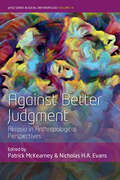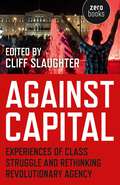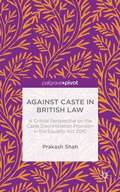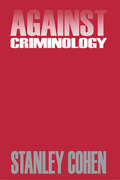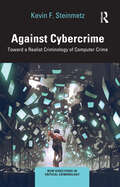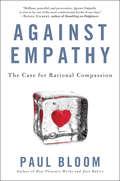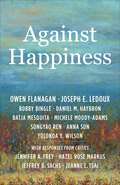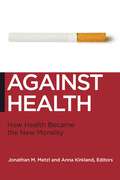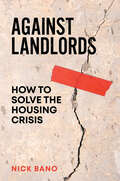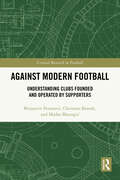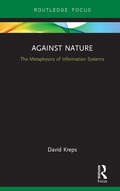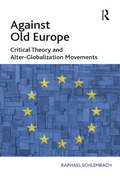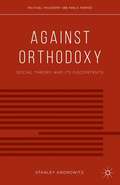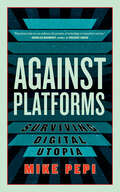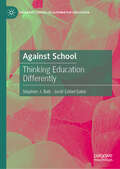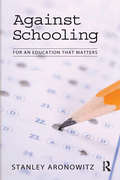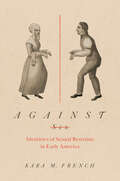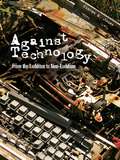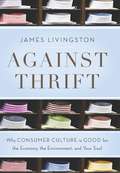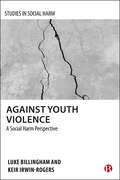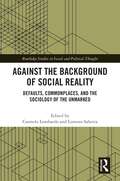- Table View
- List View
Against Autonomy
by Sarah ConlySince Mill's seminal work On Liberty, philosophers and political theorists have accepted that we should respect the decisions of individual agents when those decisions affect no one other than themselves. Indeed, to respect autonomy is often understood to be the chief way to bear witness to the intrinsic value of persons. In this book, Sarah Conly rejects the idea of autonomy as inviolable. Drawing on sources from behavioural economics and social psychology, she argues that we are so often irrational in making our decisions that our autonomous choices often undercut the achievement of our own goals. Thus in many cases it would advance our goals more effectively if government were to prevent us from acting in accordance with our decisions. Her argument challenges widely held views of moral agency, democratic values and the public/private distinction, and will interest readers in ethics, political philosophy, political theory and philosophy of law.
Against Better Judgment: Akrasia in Anthropological Perspectives (WYSE Series in Social Anthropology #14)
by Patrick McKearney Nicholas H.A. EvansAnthropologists have long explained social behaviour as if people always do what they think is best. But what if most of these explanations only work because they are premised upon ignoring what philosophers call 'akrasia' – that is, the possibility that people might act against their better judgment? The contributors to this volume turn an ethnographic lens upon situations in which people seem to act out of line with what they judge, desire and intend. The result is a robust examination of how people around the world experience weaknesses of will, which speaks to debates in both the anthropology of ethics and moral philosophy.
Against Capital: Experiences of Class Struggle and Rethinking Revolutionary Agency
by Cliff SlaughterThe problem is not how to manage the capital system, but to get rid of it&’. And who will do the job? These are the questions posed at the start of Cliff Slaughter&’s latest book. Recognising the importance of István Mészáros&’s analysis - in Beyond Capital (1995) and other books - of the historic, &‘structural crisis&’ that has taken capital into its stage of &‘destructive self-reproduction&’, Against Capital focuses on the crucial question of agency. Today, when there are fundamental disjunctures between the globalised economy, the means of social control and political and state structures, what are we to make of Marx&’s conclusion that the working class - capital&’s only structural antagonist - is &‘the gravedigger&’ of capitalism? And what are the implications for this of the information revolution, the changing composition of the working class, and the emergence of new forms of oppositional organisation, with young people to the fore? Slaughter assembles contributions by participants in recent movements in South Africa, Britain, Spain, Mexico, countries in the former Soviet zone and - in a major contribution from Yassamine Mather - the Middle East. He offers an extended critique of &‘vanguardist&’ conceptions such as Trotsky&’s &‘the crisis of humanity is reduced to the crisis of working-class revolutionary leadership&’ and Kautsky&’s and the early Lenin&’s formulation that socialist consciousness must be brought to the working class &‘from the outside&’. Finally, Against Capital examines the necessary theoretical foundations of a rebuilt working-class movement, with special attention to the concepts of class-consciousness and the relation between theory and practice. This book is a compelling and distinctive contribution to recent debates encompassing works such as Thomas Piketty&’s Capital in the Twenty-First Century (2014) and Paul Mason&’s PostCapitalism (2015).
Against Caste in British Law: A Critical Perspective On The Caste Discrimination Provision In The Equality Act 2010
by Prakash ShahThis book discusses the salience of the caste question in UK law. It provides the background to how the caste provision came into the Equality Act 2010 and how it was reinforced in 2013, and analyses the various interests that played a role in getting caste into law.
Against Criminology
by Stanley CohenDuring the 1960s, traditional thinking about crime and its punishment, deviance and its control, came under radical attack. The discipline of criminology split into feuding factions, and various schools of thought emerged, each with quite different ideas about the nature of the crime problem and its solutions. These differences often took political form, with conservative, liberal, and radical supporters, and the resulting controversies continue to reverberate throughout the fields of criminology and sociology, as well as related areas such as social work, social policy, psychiatry, and law. Stanley Cohen has been at the center of these debates in Britain and the United States. This volume is a selection of his essays, written over the past fifteen years, which contribute to and comment upon the major theoretical conflicts in criminology during this period. Though associated with the "new" or radical criminology, Cohen has always been the first to point out its limitations particularly in translating its theoretical claims into real world applications. His essays cove a wide range of topics-political crime, the nature of individual responsibility, the implications of new theories for social work practice, models of crime used in the Third World, banditry and rebellion, and the decentralization of social control. Also included is a previously unpublished paper on how radical social movements such as feminism deal with criminal law. Many criminology textbooks present particular theories or research findings. This book uniquely reviews the main debates of the last two decades about just what the role and scope of the subject should be.
Against Cybercrime: Toward a Realist Criminology of Computer Crime (New Directions in Critical Criminology)
by Kevin F. SteinmetzThis book advances a theoretically informed realist criminology of computer crime. Looking beyond current strategies of online crime control, this book argues for a new sort of policy that addresses the root causes of computer crime and criminality, reduces the harms experienced by the victims of such crimes, and does not unduly contribute to state and corporate power and surveillance. Drawing both on the proponents of realist criminology and on those who have leveled critiques of the approach, Steinmetz illustrates the contours of a realist criminology of computer crime by considering definitions of harm with online crime, the idiosyncrasies of online locality and community, the social relations of computer crime, the tension between piecemeal reform and structural changes, and other matters. Furthermore, Steinmetz surveys the methodological dimensions of computer crime research, offers a critique of positivist “computational criminology,” and posits an agenda for computer crime policy. Against Cybercrime is an essential reading for all those engaged with cybercrime, realist criminology, criminological theory, and social harm online.
Against Empathy: The Case for Rational Compassion
by Paul BloomWe often think of our capacity to experience the suffering of others as the ultimate source of goodness. Many of our wisest policy-makers, activists, scientists, and philosophers agree that the only problem with empathy is that we don't have enough of it.Nothing could be farther from the truth, argues Yale researcher Paul Bloom. In AGAINST EMPATHY, Bloom reveals empathy to be one of the leading motivators of inequality and immorality in society. Far from helping us to improve the lives of others, empathy is a capricious and irrational emotion that appeals to our narrow prejudices. It muddles our judgment and, ironically, often leads to cruelty. We are at our best when we are smart enough not to rely on it, but to draw instead upon a more distanced compassion. Basing his argument on groundbreaking scientific findings, Bloom makes the case that some of the worst decisions made by individuals and nations--who to give money to, when to go to war, how to respond to climate change, and who to imprison--are too often motivated by honest, yet misplaced, emotions. With precision and wit, he demonstrates how empathy distorts our judgment in every aspect of our lives, from philanthropy and charity to the justice system; from medical care and education to parenting and marriage. Without empathy, Bloom insists, our decisions would be clearer, fairer, and--yes--ultimately more moral.Brilliantly argued, urgent and humane, AGAINST EMPATHY shows us that, when it comes to both major policy decisions and the choices we make in our everyday lives, limiting our impulse toward empathy is often the most compassionate choice we can make.
Against Happiness
by Owen Flanagan Batja Mesquita Anna Sun Joseph E. LeDoux Daniel M. Haybron Michele Moody-Adams Bobby Bingle Songyao Ren Yolonda Y. WilsonThe “happiness agenda” is a worldwide movement that claims that happiness is the highest good, happiness can be measured, and public policy should promote happiness. Against Happiness is a thorough and powerful critique of this program, revealing the flaws of its concept of happiness and advocating a renewed focus on equality and justice.Written by an interdisciplinary team of authors, this book provides both theoretical and empirical analysis of the limitations of the happiness agenda. The authors emphasize that this movement draws on a parochial, Western-centric philosophical basis and demographic sample. They show that happiness defined as subjective satisfaction or a surplus of positive emotions bears little resemblance to the richer and more nuanced concepts of the good life found in many world traditions. Cross-cultural philosophy, comparative theology, and social and cultural psychology all teach that cultures and subcultures vary in how much value they place on life satisfaction or feeling happy. Furthermore, the ideas promoted by the happiness agenda can compete with rights, justice, sustainability, and equality—and even conceal racial and gender injustice.Against Happiness argues that a better way forward requires integration of cross-cultural philosophical, ethical, and political thought with critical social science. Ultimately, the authors contend, happiness should be a secondary goal—worth pursuing only if it is contingent on the demands of justice.
Against Health: How Health Became the New Morality (Biopolitics #18)
by Anna Kirkland Jonathan M. MetzlNavigates the divergent cultural meanings of health, and its entanglement with morality in current political discourseYou see someone smoking a cigarette and say,“Smoking is bad for your health,” when what you mean is, “You are a bad person because you smoke.” You encounter someone whose body size you deem excessive, and say, “Obesity is bad for your health,” when what you mean is, “You are lazy, unsightly, or weak of will.” You see a woman bottle-feeding an infant and say,“Breastfeeding is better for that child’s health,” when what you mean is that the woman must be a bad parent. You see the smokers, the overeaters, the bottle-feeders, and affirm your own health in the process. In these and countless other instances, the perception of your own health depends in part on your value judgments about others, and appealing to health allows for a set of moral assumptions to fly stealthily under the radar.Against Health argues that health is a concept, a norm, and a set of bodily practices whose ideological work is often rendered invisible by the assumption that it is a monolithic, universal good. And, that disparities in the incidence and prevalence of disease are closely linked to disparities in income and social support. To be clear, the book's stand against health is not a stand against the authenticity of people's attempts to ward off suffering. Against Health instead claims that individual strivings for health are, in some instances, rendered more difficult by the ways in which health is culturally configured and socially sustained.The book intervenes into current political debates about health in two ways. First, Against Health compellingly unpacks the divergent cultural meanings of health and explores the ideologies involved in its construction. Second, the authors present strategies for moving forward. They ask, what new possibilities and alliances arise? What new forms of activism or coalition can we create? What are our prospects for well-being? In short, what have we got if we ain't got health? Against Health ultimately argues that the conversations doctors, patients, politicians, activists, consumers, and policymakers have about health are enriched by recognizing that, when talking about health, they are not all talking about the same thing. And, that articulating the disparate valences of “health” can lead to deeper, more productive, and indeed more healthy interactions about our bodies.
Against Landlords: How to Solve the Housing Crisis
by Nick BanoWhen landlords always win and renters pay the price, what can be done?Housing means prosperity and security for some; poverty, precarity and sickness for others. More people live in private rented accommodation than ever before, and rents rise without apparent reason. Homes are smaller every year, and nearly 20 per cent of tenants live in hazardous conditions. Homelessness is at a new high. Yet the government&’s only solution is to promote homeownership.Against Landlords shows that this crisis is not the product of happenstance or political incompetence. Government policy has intentionally split British citizens into homeowners and renters, two classes set on very different financial paths. In the UK, one out of every twenty-one adults is a landlord, and it is this group, and those who aspire to join it, represented by the political class.In his radical new interpretation of the housing crisis, lawyer Nick Bano explains how this environment set the conditions for the Grenfell Tower fire and how it means a life of anxiety for the nation&’s renters. It is a problem that stretches far beyond London and one inherently racist in nature.Building more housing is not the solution. It is firstly a problem of the law, Bano argues, and reforms must sweep away the landlordism at the heart of the housing crisis and British political life.
Against Love
by Laura KipnisWho would dream of being against love? No one.Love is, as everyone knows, a mysterious and all-controlling force, with vast power over our thoughts and life decisions.But is there something a bit worrisome about all this uniformity of opinion? Is this the one subject about which no disagreement will be entertained, about which one truth alone is permissible? Consider that the most powerful organized religions produce the occasional heretic; every ideology has its apostates; even sacred cows find their butchers. Except for love. Hence the necessity for a polemic against it. A polemic is designed to be the prose equivalent of a small explosive device placed under your E-Z-Boy lounger. It won't injure you (well not severely); it's just supposed to shake things up and rattle a few convictions.From the Trade Paperback edition.tical questions about the social contract itself? What is the trade-off between personal gratification and the renunciations society demands of us? And is "working at your relationship" just another way of propping up the work ethicæas if we weren't all overworked enough as it is? If adultery is ultimately a referendum on the sustainability of monogamy, how credible is the basic premise of modern coupledom: that desire for your one and only love can and will persist through a lifetime of togetherness (despite so much evidence to the contrary)?Against Love offers no easy answers. Rather it intends to engage you in a commonsensical and brave examination of the plight of the modern personality, caught between the vicissitudes of desire and the decrees of social conformity.From the Hardcover edition.
Against Modern Football: Understanding Clubs Founded and Operated by Supporters (Critical Research in Football)
by Christian Brandt Benjamin Perasović Marko MustapićThis is the first book to offer in-depth analysis of the "Against Modern Football" movement through the comparison of two AMF clubs. The movement has emerged in opposition to the rampant commercialisation of football and the lack of supporters’ influence over the governance of the clubs they support. Drawing on long-term ethnographic research, the book examines the foundation, organisation and governance of new clubs set up by supporters as part of the AMF movement. Centred on detailed case studies of two clubs in particular—HFC Falke in Germany, founded in 2014, and Varteks Varaždin in Croatia, founded in 2011—the book explores supporter cultures and identity and considers the social processes at work in the foundation of new football clubs. By examining the unique local and national contexts in which HFC Falke and Varteks Varaždin have emerged, as well the broader international context that encompasses well-known AMF clubs such as FC United of Manchester, the book makes an important contribution to our understanding of supporters, their activism, the significance of football clubs, and social movements more broadly. This book is fascinating reading for anybody with an interest in football, the sociology of sport, sport management, the politics of sport, social movements, subcultures, or ethnography.
Against Nature: The Metaphysics of Information Systems
by David KrepsThis book questions the nature of the business and social information systems so ubiquitous in contemporary life. Linking positivism, individualism, and market-fundamentalist economics at the root of these systems, it critiques the philosophical ground of this triumvirate as fundamentally against nature. Connecting counter-philosophies of the subject as a natural part of existence, with more collectivist and ecological economics, it presents a historical critique of the development of the academic field of information systems and offers a complex view of the nature of Nature through which we might reshape our approach to technology and to our economies to overcome the existential threat of climate change. As such, it will appeal to philosophers, social theorists, and scholars of science and technology studies with interests in the environment and ecology, as well as those working in the field of information systems.
Against Old Europe: Critical Theory and Alter-Globalization Movements
by Raphael SchlembachIn the wake of the Iraq war, the term Old Europe was appropriated by politicians, civil society and social movement actors alike to rally in defence of supposedly social and civilized values against the perceived predatory forces of American finance. Against Old Europe sheds light on the social movement politics encapsulated in the protest slogan 'Fight Old Europe'. Within what is broadly labelled the global justice movement, it explores a particular, radical perspective that warns against the identification with European values by movements resisting neoliberalism. Exploring the work of key theorists critical of globalization, including Habermas, Negri, Holloway, Postone and de Benoist, the book examines critical theory approaches to alter-globalization, illustrated with concrete examples of movements within contemporary Europe. In so doing, it invites readers to explore the charges of nationalism, anti-Americanism and antisemitism brought against parts of the alter-globalization movement. Providing a new perspective on critiques of globalization, Against Old Europe will appeal to sociologists and social and political theorists studying social movements, anti-globalization activism and European politics and identity.
Against Orthodoxy
by Stanley AronowitzIn Against Orthodoxy, the author engages some of the most provocative thinkers of the twentieth century, including Georg Lukacs, Antonio Gramsci, Herbert Marcuse, Karl Marx, Harry Braverman and Paulo Freire. All of these social and political theorists were dedicated to fundamental social change, but many were forced to recognize the difficulty of achieving change in the modern world. This book demonstrates that all of them reject conventional interpretations of how radical change mightbe possible. What marks their unity is an effort to address capitalism's ability to incorporate widespread popular alienation. Consequently they urge serious attention to issues of culture, subjectivity, and education.
Against Platforms: Surviving Digital Utopia (Activist Citizens Library)
by Mike PepiA bold and imaginative critique of the hidden costs of digital life – and a manifesto for a better future . . .At the turn of the millennium, digital technologies seemed to have immense promise for transforming our society. With these powerful new tools, the thinking went, we would be free to live our best lives, connected to our communities in ways full of infinite potential.A quarter of a century on, this form of utopianism seems like a cruel mirage. Our lives are more fragmented and pressure-filled as ever, as we race to keep up with technologies that manipulate, command, and drain us at every turn. So what happened? In Against Platforms, technologist and creator Mike Pepi lays out an explanation of what went wrong – and a manifesto for putting it right.The key, says Pepi, is that we have been taught that digital technologies are neutral tools, transparent, easily understood, and here to serve us. The reality, Pepi says, is that they are laden with assumptions and collateral consequences – ideology, in other words. And it is this hidden ideology that must be dismantled if we are to harness technology for the fullest expression of our humanity.
Against School: Thinking Education Differently (Palgrave Studies in Alternative Education)
by Stephen J. Ball Jordi Collet-SabéThis book invites the reader to think education against, beyond and without the school and its paraphernalia. To think about &‘education&’, rather than schooling, and what kind of education is relevant to and needed now in the complex, difficult and dangerous world we live in. That invitation means testing our limits, questioning and changing ourselves and thinking the practice of education differently. The book is not about tinkering, improving, reforming – it about clearing away the detritus of the school and using the space created to explore education as self-formation and commoning. It will be of interest to scholars and graduate students of alternative education, schooling, educational policy and philosophy, and the sociology of education.
Against Schooling: For an Education That Matters (Radical Imagination Ser.)
by Stanley AronowitzIn Against Schooling, Stanley Aronowitz passionately raises an alarm about the current state of education in our country. Discipline and control over students, Aronowitz argues, are now the primary criteria of success, and genuine learning is sacrificed to a new educational militarism. In an age where school districts have imposed testing, teachers must teach to test, and both teacher and student are robbed of their autonomy and creativity. The crisis extends to higher education, where all but a few elite institutions are becoming increasingly narrowly focused and vocational in their teaching. With education lacking opportunity for self-reflection on broad social and historical dynamics, Against Schooling asks "How will society be able to solve its most pressing problems?" Aronowitz proposes innovative approaches to get schools back on track..
Against Security: How We Go Wrong at Airports, Subways, and Other Sites of Ambiguous Danger - Updated Edition
by Harvey MolotchHow security procedures could be positive, safe, and effectiveThe inspections we put up with at airport gates and the endless warnings we get at train stations, on buses, and all the rest are the way we encounter the vast apparatus of U.S. security. Like the wars fought in its name, these measures are supposed to make us safer in a post-9/11 world. But do they? Against Security explains how these regimes of command-and-control not only annoy and intimidate but are counterproductive. Sociologist Harvey Molotch takes us through the sites, the gizmos, and the politics to urge greater trust in basic citizen capacities—along with smarter design of public spaces. In a new preface, he discusses abatement of panic and what the NSA leaks reveal about the real holes in our security.
Against Sex: Identities of Sexual Restraint in Early America (Gender and American Culture)
by Kara M. FrenchHow much sex should a person have? With whom? What do we make of people who choose not to have sex at all? As present as these questions are today, they were subjects of intense debate in the early American republic. In this richly textured history, Kara French investigates ideas about, and practices of, sexual restraint to better understand the sexual dimensions of American identity in the antebellum United States. French considers three groups of Americans—Shakers, Catholic priests and nuns, and followers of sexual reformer Sylvester Graham—whose sexual abstinence provoked almost as much social, moral, and political concern as the idea of sexual excess. Examining private diaries and letters, visual culture and material artifacts, and a range of published works, French reveals how people practicing sexual restraint became objects of fascination, ridicule, and even violence in nineteenth-century American culture. Against Sex makes clear that in assessing the history of sexuality, an expansive view of sexual practice that includes abstinence and restraint can shed important new light on histories of society, culture, and politics.
Against Technology: From the Luddites to Neo-Luddism
by Steven E. JonesThis book addresses the question of what it might mean today to be a Luddite--that is, to take a stand against technology. Steven Jones here explains the history of the Luddites, British textile works who, from around 1811, proclaimed themselves followers of "Ned Ludd" and smashed machinery they saw as threatening their trade. Against Technology is not a history of the Luddites, but a history of an idea: how the activities of a group of British workers in Yorkshire and Nottinghamshire came to stand for a global anti-technology philosophy, and how an anonymous collective movement came to be identified with an individualistic personal conviction. Angry textile workers in the early nineteenth century became romantic symbols of a desire for a simple life--certainly not the original goal of the actions for which they became famous. Against Technology is, in other words, a book about representations, about the image and the myth of the Luddites and how that myth was transformed over time into modern neo-Luddism.
Against Thrift
by James LivingstonSince the financial meltdown of 2008, economists, journalists, and politicians have uniformly insisted that to restore the American Dream and renew economic growth, we need to save more and spend less. In his provocative new book, historian James Livingston-author of the classic Origins of the Federal Reserve System-breaks from the consensus to argue that underconsumption caused the current crisis and will prolong it. By viewing the Great Recession through the prism of the Great Depression, Livingston proves that private investment is not the engine of growth we assume it to be. Tax cuts for business are therefore a recipe for disaster. If our goal is to reproduce the economic growth of the postwar era, we need a redistribution of income that reduces corporate profits, raises wages, and promotes consumer spending.
Against Youth Violence: A Social Harm Perspective (Studies in Social Harm)
by Luke Billingham Keir Irwin-RogersAvailable open access digitally under a CC-BY-NC-ND licence. For many children and young people, Britain is a harmful society in which to grow up. This book contextualizes the violence that occurs between a small number of young people within a wider perspective on social harm. Aimed at academics, youth workers and policy makers, the book presents a new way to make sense of this pressing social problem. The authors also propose measures to substantially improve the lives of Britain’s young people in areas ranging from the early years to youth services and the criminal justice system.
Against the Background of Social Reality: Defaults, Commonplaces, and the Sociology of the Unmarked (Routledge Studies in Social and Political Thought)
by Lorenzo Sabetta Carmelo LombardoThe first wide-ranging, organic analysis of the sociology of unmarkedness and taken-for-grantedness, this volume investigates the asymmetry between how we attend to the culturally emphasized features of social reality and ignore the culturally unmarked ones. Concerned with the structures of cultural invisibility, unconscious rules of irrelevance, automatic frames of meaning, and collective attention patterns, it brings together scholarship spanning sociology, anthropology, and social psychology, to cover various aspects of humdrum, unglamorous, nondescript, nothing-to-write-at-home-about social phenomena, developing the key assumptions, underpinnings, and implications of this field of study.As comprehensive analysis of unremarked features of our social existence, this book will appeal to scholars across the social sciences with interests in social theory and the sociology of everyday life.
Against the Commons: A Radical History of Urban Planning
by Álvaro Sevilla-BuitragoAn alternative history of capitalist urbanization through the lens of the commons Characterized by shared, self-managed access to food, housing, and the basic conditions for a creative life, the commons are essential for communities to flourish and protect spaces of collective autonomy from capitalist encroachment. In a narrative spanning more than three centuries, Against the Commons provides a radical counterhistory of urban planning that explores how capitalism and spatial politics have evolved to address this challenge.Highlighting episodes from preindustrial England, New York City and Chicago between the 1850s and the early 1900s, Weimar-era Berlin, and neoliberal Milan, Álvaro Sevilla-Buitrago shows how capitalist urbanization has eroded the egalitarian, convivial life-worlds around the commons. The book combines detailed archival research with provocative critical theory to illuminate past and ongoing struggles over land, shared resources, public space, neighborhoods, creativity, and spatial imaginaries.Against the Commons underscores the ways urbanization shapes the social fabric of places and territories, lending particular awareness to the impact of planning and design initiatives on working-class communities and popular strata. Projecting history into the future, it outlines an alternative vision for a postcapitalist urban planning, one in which the structure of collective spaces is ultimately defined by the people who inhabit them.

